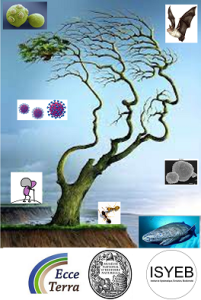‘Expanding evolutionary theories of ageing’ Colloquium (May 10th 2022)
“Expanding evolutionary theories of ageing to take into account symbioses and interactions throughout the Web of Life”.

This colloquium will seek to explore traditional limits to the main evolutionary theories of ageing and to propose novel findings to improve our understanding of how, why and when organisms age in the Web of Life. It will question the explanatory scope and the phylogenetic scope of at least three leading, stimulating evolutionary theories of ageing, namely the Mutation Accumulation theory, the Antagonistic pleiotropy theory and the Disposable Soma theory. Indeed, these theories share a common blindspot. The first two have been developed under the traditional framework of population genetics, and therefore are logically centered on the ageing of individuals within a population or within a species. The third one is usually applied to explain ageing within a species. Consequently, these theories do not explicitly model the countless interspecific and ecological interactions, such as symbioses and host-microbiomes associations, however well-known to affect many organismal traits as well as organismal evolution. Moreover, these theories have been mostly developed with animal models in mind, mainly those with a neat germen/soma distinction, such as mice and humans, and for this reason all these theories may benefit from novel conceptual developments to further justify and possibly expand their application scope towards other taxa, such as unicellular organisms (protists, bacteria and archaea), which have long been considered, by default and probably erroneously, as non-senescent, and such as extremely long lived taxa, which owing to their unusual biology may still have some lessons to contribute to these theories.
Scientific program :
8:45-8:50AM: A quick introduction and welcome words (E. Bapteste)
Current theoretical framework and some of its limits
8:51-9:21: Pr. Annette Baudisch (University of Southern Denmark, DK) « The diversity of ageing patterns in the phylogeny of Life.»
9:22-9:52: Pr. Joao Pedro de Magalhaes (University of Liverpool, UK) « Some thoughts on the limits to our understanding of the genetic, cellular and molecular mechanisms of ageing throughout the Tree of life. »
9:53-10:23: Pr. Emma Teeling (University College Dublin, Ireland) « Lessons from bats and possibly other long-lived species longevity analyses, and the importance to study ageing in natural populations. »
Ageing through the prism of interactions
10:23-10:53: Pr. Laurent Keller (University of Lausanne, Switzerland) « Diversity of ageing patterns in relation with the social interactions within ageing species »
10:54-11:24: Dr. Ophélie Ronce (CNRS, France): « Evolution of ageing in a changing environment »
11:25-11h55: Dr. Jérôme Teulière (ISYEB, Paris, France) « Phylosystemics of ageing : inferring ancestral longevity networks. »
11h56-12:26: Dr. Eric Bapteste (ISYEB, Paris, France/UNIL, Switzerland) « Interspecific interactions that affect ageing: introducing age-distorters that manipulate host ageing to their own evolutionary benefits. »
LUNCH BREAK
Unicellularity and ageing
14:00-14:30: Dr. Ariel B. Lindner (INSERM, Université Paris Cité, France) « Ageing patterns in bacteria »
14:31-15:01: Dr. Virginija Cvirkaite-Krupovic (Pasteur, France) « Asymmetric cell division in Archaea infected by viruses and possible connection to ageing »
15:02-15:32: Dr. Francesco Catania (International Visiting Scholar at Fukushima University, Institute of Environmental Radioactivity, Japan) « Ageing in protists and/or what a protistologist perspective may bring to ageing studies »
Microbiome and host ageing
15:33-16:03: Pr. William Ludington (Carnegie Institution for Science, Johns Hopkins University, USA) « Impact of microbiomes on host ageing across the Tree of Life»
16:04-16:34 : Pr. Claudio Franceschi (University of Bologna, Italy) « Connections between microbiomes, viruses and host ageing »
16:35-17:05: Dr. François Leulier (Institut de Génomique Fonctionnelle de Lyon, France) « Microbiome, ageing and nutrition »
Conclusion:
17:06-17:36: Dr. Philippe Huneman (CNRS, France) « Main philosophical issues associated with ageing and with ageing studies »
